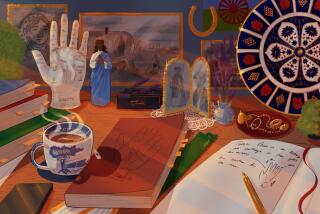‘Eat Pray Love’: A spiritual quest and a triumph of capitalism
I was hoping to avoid writing about “Eat Pray Love.” The movie’s been out for two weeks, and the book has been out for four years, 184 weeks of which it’s been on the New York Times bestseller list. Not that you need to be told, but “Eat Pray Love” (often abbreviated EPL) chronicles writer Elizabeth Gilbert’s post-divorce spiritual quest through Italy, India and Bali.
Gilbert, played by Julia Roberts in the film, has appeared on “The Oprah Winfrey Show” three times (most recently with Roberts), and the tale of “Eat Pray Love” — not just what’s told in the book but the story of its head-spinning success and the anointment of its author into something resembling a modern-day guru — has become a bona fide cultural meme.
It has also become a major merchandizing opportunity. There’s an EPL-themed product line at Cost Plus World Market (incense burners, beaded jewelry and Eat Pray Love™ tea from the Republic of Tea). The Home Shopping Network offered 72 straight hours of movie promotions and product tie-ins (an organic cotton T-shirt reading “Nourish Your Soul” for $39.90, an Eat Pray Love™ Sony™ Pocket Edition e-reader with special case for $229.95).
Meanwhile, EPL tourism has become its own niche, with travel companies offering packages through Italy, India and Bali, usually with the single female traveler in mind. Lonely Planet travel guides, for instance, offer tips on how to eat the same gelato Gilbert ate in Rome and how to find the Balinese medicine man who, according to the book, told her to “smile in your liver.”
So you get the idea. It’s not just a book-turned-movie. It’s a lifestyle-turned-consumer-phenomenon-turned-quasi-religion. Never mind that this lifestyle — at least the part that entails airfare, lodging and vacation time — requires an independent income and an extended break from personal or professional responsibilities. Never mind that these consumer goods tend to run the way of colorful paper lanterns you think will transform your yard instantly from a dirt heap into a Balinese paradise but fall apart when you attempt to remove them from the box (not that I tried this). Never mind that “quasi-religion” is surely an overly generous way of describing what you get after months of eating, praying, loving and, to go by the movie, riding your bike past glistening rice paddies while wearing adorable hats.
To my mind, Gilbert has epiphanies with more regularity than certain bodily functions, and that stretches the limits of credulity, but that also may be beside the point. After all, people (women especially but not exclusively) are really digging this thing. EPL is apparently winning hearts and minds, filling a need, getting people excited. And for all the quasi-ness of this quasi-religion, this sort of engagement is something a lot of established, non-quasi religions aren’t having much luck with these days.
Still, I’m not suggesting that people are snapping up “Nourish Your Soul” T-shirts out of an overt frustration with organized religion or that the cult of personality around Gilbert portends the demise of more traditional objects of worship. If anything, Gilbert’s breezier-than-thou tone has the same earnest ring you often hear from the pulpit (when it’s called holier than thou).
But this brings me back to why I couldn’t help but write about EPL. Now that its journey through the zeitgeist has exceeded any of the peregrinations depicted in the book itself, and now that its author is an icon and her musings are a brand, the real epiphany is less about New Age pabulum than old-school capitalism — and, specifically, about how brilliantly the two work together. It’s a bit queasy-making, sure. But it’s also kind of like smiling in your liver. If you can manage that, maybe you deserve your own line of incense burners.
More to Read
Sign up for The Wild
We’ll help you find the best places to hike, bike and run, as well as the perfect silent spots for meditation and yoga.
You may occasionally receive promotional content from the Los Angeles Times.







